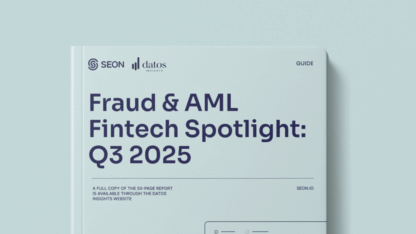Best TruValidate Alternatives
| Company | Core Features | Notable Clients | Summary |
| SEON | • digital profiling • whitebox AI • transaction monitoring • preset industry & customizable rules • email, IP & phone data enrichment analysis • advanced device fingerprinting • AML module | Revolut, Air France, Kindred | Frictionless, in-depth customer profiling and flexible rules with ML insights, AML screening and free plan |
| Accertify | • chargeback management • refund abuse protection • dedicated statistician team for oversight • embedded verification • decision science-powered | Southwest Airlines, Ticketmaster, Ubisoft | Flexible fraud prevention making use of decision science |
| Emailage (LexisNexis) | • email & IP analysis • machine learning • behavior tracking • custom rules & presets • taps into the LexisNexis Risk Solutions network | LV= GI, OFX, Gol Airlines | Email intelligence with machine learning to inform risk |
| SHIELD | • device fingerprinting • real-time profiling • persistent profile updates • focus on gaming, apps, ridesharing | TrueMoney, MPL, Razer, OMNI | Persistent user profiles to detect behavior associated with risk |
| ThreatMetrix (LexisNexis) | • on-premise deployment • large IP database • graph visualization • advanced device identifiers • taps into the LexisNexis Risk Solutions network | TripAdvisor, TD Bank, GoPro | On-premise or cloud-based risk management |
With more than 340+ reviews, SEON is the market leader and G2’s best fraud detection solution.
What Does TruValidate Offer?
The backstory of this fraud prevention solution has meant it’s had three distinct names over the year: Iovation (often stylized in all lowercase: “iovation”), TransUnion, and now TruValidate.
Since 2004, when Iovation was founded, it became a fraud prevention staple for the world of online real-money gaming, also known as iGaming – which includes online casinos, poker rooms, sportsbooks, etc.
In July 2018, it was announced that it had been acquired by risk and information solutions powerhouse TransUnion, which is famous for providing credit scoring. Iovation was integrated into the latter’s product at first but has since rebranded to TransUnion TruValidate.
TruValidate promises to support companies through identity proofing, customer verification, risk-based authentication, and fraud analytics. To do this, the technology leveraged includes:
- device intelligence and risk
- document verification
- device fingerprinting and knowledge-based authentication
- identity verification
- device-based reputation network
TransUnion also offers unique risk management tools, such as TruEmpower, designed to manage credit health, TruLookup, an OSINT solution, and TruIQ, designed for business intelligence and data analytics. All of the aforementioned tools integrate seamlessly, although it might not necessarily be the case with third-party risk management solutions.
Why Look for a TruValidate Alternative?
TruValidate is a well-established solution but, as it happens with every product, it does not suit everyone.
Some negatives that have been mentioned in customer reviews include potentially stale data, as the 30+ million report database contains information from almost two decades of the solution’s activity. There is also no free trial available.
Because it is part of a larger suite of services provided by TransUnion, it is also possible that you may end up paying for functionality you don’t use, while it can be confusing to less experienced customers to navigate the various options.
Finally, an absence of transparent pricing can be a red flag for startups and smaller businesses who quickly need to be able to calculate ROI before signing a multi-year contract.
Five TruValidate Alternatives
Let’s now take a look at five of the most promising candidates to replace TruValidate, if you already use it – or simply to consider if you are just researching this solution.
For each, we’ll highlight the pros and cons, as well as their primary features.
SEON
Features & Use Cases
The beginnings of SEON go back to 2015, when Tamas Kadar and Bence Jendruszak realized there was nothing out there that fully covered their then needs in terms of anti-fraud functionality.
SEON was founded with the goal of protecting anyone doing digital business and the promise to deliver useful functionality from day one. To demonstrate this, the team provides a completely free plan that offers all the features and only limits the number of API calls (2,000 at the time of writing).
To demonstrate this, the team provides free bespoke demos that use customers’ own data to hammer the point home, as well as a 30-day free trial.
SEON’s solution employs advanced technologies that give both the risk engine and manual reviewers a 360-degree view of the user being examined.
There’s device fingerprinting, behavioral analysis, IP analysis with velocity checks, and frictionless data enrichment from email and phone numbers.
As for the rulesets themselves, industry presets, whitebox machine-learning generated suggestions particular to each merchant’s fraud event history, as well as full customization according to the customer’s risk appetite and preferences, are all available for organizations to choose from.
SEON’s strong suits include its unique digital footprint technology, highly rated customer support, and quick deployment. As for criticisms, some customers have pointed out occasional lag that nevertheless resolves itself upon retry.
Finally, an AML module allows you to remain compliant simply by checking names against a list of global databases. This makes for an easy solution that obviates the need for a complex risk management tech stack: everything can be accessed from the same SEON dashboard.
SEON’s customers include Patreon, Air France, Kindred and FairMoney. In general terms, the vendor seeks to help every online company with fraud concerns, including those in ecommerce, banking, fintech, BNPL, iGaming, ticketing and insurance.
Accertify
Features & Use Cases
Accertify is another fraud startup eventually acquired by a finance-adjacent household name: American Express. This was completed a while back, in 2010, to the tune of a reported $150 million.
From its Chicago headquarters, Accertify provides separate solutions for digital identity verification, SCA optimization, refund/chargeback resolution, and fraud management.
Naturally, there is some overlap in the technology used by these, but it is convenient for their customers to pick and choose only what suits their needs.
On offer to customers are real-time dashboards with detailed reporting and scoring based on heuristic ML models, delivering results through IP analysis, device fingerprinting, and behavior tracking algorithms, while they also boast two of the industry’s most comprehensive databases.
In terms of possible shortcomings to keep in mind, there is no data enrichment from social/web platforms. The database’s data can potentially be stale as it is not sourced in real-time, while some users report integration issues with other vendors’ solutions.
This enterprise-grade fraud prevention solution is #1 in airlines and travel, also serving organizations in industries such as retail, finance and iGaming. Customers include Greyhound, EasyJet, Urban Outfitters, and Ryanair.
Emailage (LexisNexis)
Features & Use Cases
LexisNexis is a legal and forensic data mining solutions giant that has managed to amass an impressive series of solutions to address its clients’ needs – both developed in-house and acquired. Among these is Emailage.
Emailage began life as a startup back in 2012 to focus on email intelligence as a risk signal, thus helping companies thwart fraudsters and other bad actors.
Part of LexisNexis Risk Solutions since 2020, it has joined a network that provides access to 5+ billion email users and transaction data from 150+ countries.
In simple terms, what Emailage does is email data analysis – and does so very well. A customer may enter their address at signup, checkout or other touchpoints, at which point Emailage’s algorithms score the email address, giving merchants and fraud analysts a sense of how trustworthy the customer is.
This information is sourced from the Digital Identity Network and Emailage Network, growing at a rate of more than 80k fraud events a day and carrying LexisNexis’s prestigious name. However, this is historical data and as such can be outdated at times.
Emailage’s customers include Gol Airlines, LV= GI, and OFX. In general terms, this vendor targets financial services, insurance, big corporations, and non-profits.
SHIELD
Features & Use Cases
Founded in 2008 by Justin Lie, this Singapore-based risk intelligence company started its life as Justin’s solution to his own website’s fraud problems. Since then, SHIELD has grown to have a truly worldwide footprint, touting clients that include some of the biggest names in gaming, fintech, ride-hailing, and e-commerce. Clients like Razer, Happyfresh, OMNI, and TrueMoney.
Like other solutions in the fraud-fighting sector, SHIELD offers their own machine learning engine, which analyzes device data points in the millions as part of its real-time capabilities. Their fraud database comes from over seven billion profiled devices.
Where SHIELD sets itself apart from competitors is the ability to isolate the moment when a customer goes from being good to fraudulent, as it happens. SHIELD does this through its real-time session monitoring — the SHIELD Sentinel.
Companies like TrueMoney, Southeast Asia’s leading digital wallet app, surely seek to take advantage of Sentinel’s ability to monitor potentially malicious behavior as it happens, as will other companies that are focused on mobile payment. As with all fraud-fighting, gathering as much timely data as possible is a huge part of the battle, and companies will be able to leverage the information they get from SHIELD to tighten their security protocols as the need arises.
The SHIELD suite offers this under-the-hood transparency in great detail, allowing a security team to know who they’re interacting with, knowing how much risk each customer presents, and even offering an analysis of associated devices and accounts.
ThreatMetrix (LexisNexis)
Features & Use Cases
ThreatMetrix is yet another arrow in the powerful quiver of RiskNexis Risk Solutions, following a 2018 acquisition – though its roots go all the way back to Australia in 2005.
As such, it integrates very well into a stack of products by this company – although there are reports that it does not do as great when it comes to stacks also containing solutions from other vendors.
With a mission to help authenticate digital personas and online transactions, it now helps 6,000+ businesses worldwide.
Friction is a central concern addressed by ThreatMetrix, which deploys whitebox machine learning, behavior analytics and holistic insights to ascertain that only legitimate customers are approved.
And in fact, it promises to confidently recognize up to 95% of returning customers – which means they will not be faced with additional security prompts or be delayed by manual reviews, which in turn decreases churn and boosts revenue.
Among the benefits of using ThreatMetrix are its dynamic decision platform and transparent reasoning provided alongside the risk scores. LexisNexis also sends its own engineers to help with on-site deployment, ensuring a smooth start.
On the other hand, there is no built-in digital footprinting, while interested parties are not going to be able to benefit from a free trial, either.
On ThreatMetrix’s list of customers are TD Bank, GoPro, and TripAdvisor. You’ll find companies from virtually every industry using its services, with a noticeable presence in financial services, government, healthcare, and insurance.
How to Choose a TruValidate Alternative
We aren’t going to claim it’s easy to choose a fraud management and prevention partner for your company. It is a major decision that can even make or break a company, depending on the threat landscape in their sector.
We prepared this guide to help give you some ideas about who you can be looking into, as well as some aspects of the solutions you might want to consider.
You can perhaps continue with some additional research. Then, it is time to speak directly to the sales teams about the solutions you find more suitable, and take things from there.
FAQ for TruValidate Alternatives
TruValidate uses a pay-per-API-call payment model. However, not all vendors follow this. For others, it’s tier-based or based on transaction amount percentages.
Also, remember that some provide end-to-end solutions while others let you pick and choose which APIs to use. It’s therefore not easy to compare pricing side by side. Please speak to each sales team for personalized quotes.
TruValidate has its own micro-site on the TransUnion official domain – and for more details, you’ll have to speak to their team.
However, in the meantime, it’s a good idea to also read our side-by-side comparison of SEON vs TruValidate, as well as some customer reviews on reputable crowdsourced websites such as Capterra.
Further Reading
Learn more about:
Sift Alternatives | ThreatMetrix Alternatives | Kount Alternatives | Signifyd Alternatives
Try our free tools:
BIN Lookup | IP Lookup | Reverse Email Lookup | Reverse Phone Lookup | Social Media Lookup








